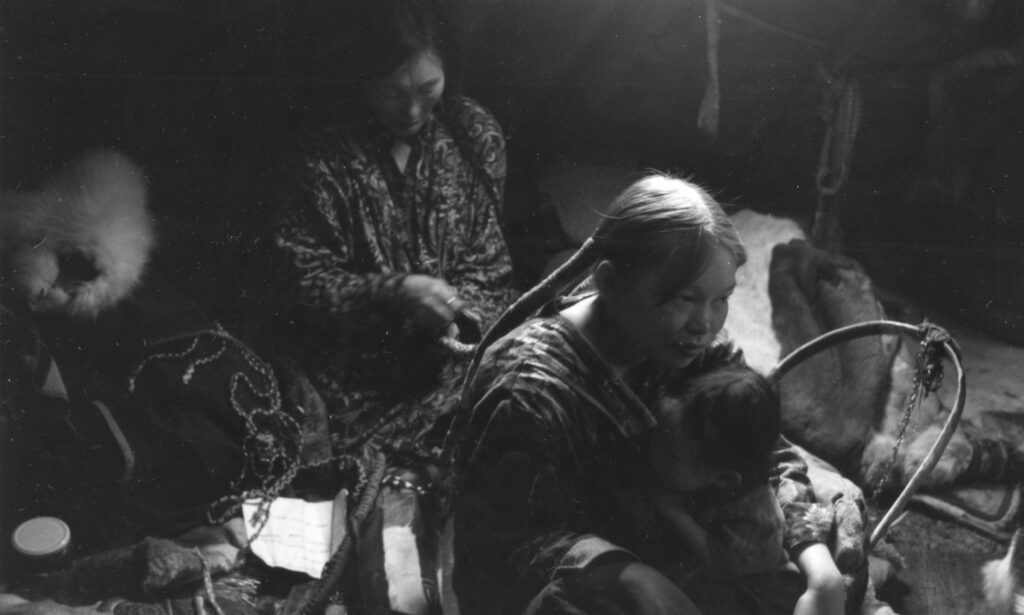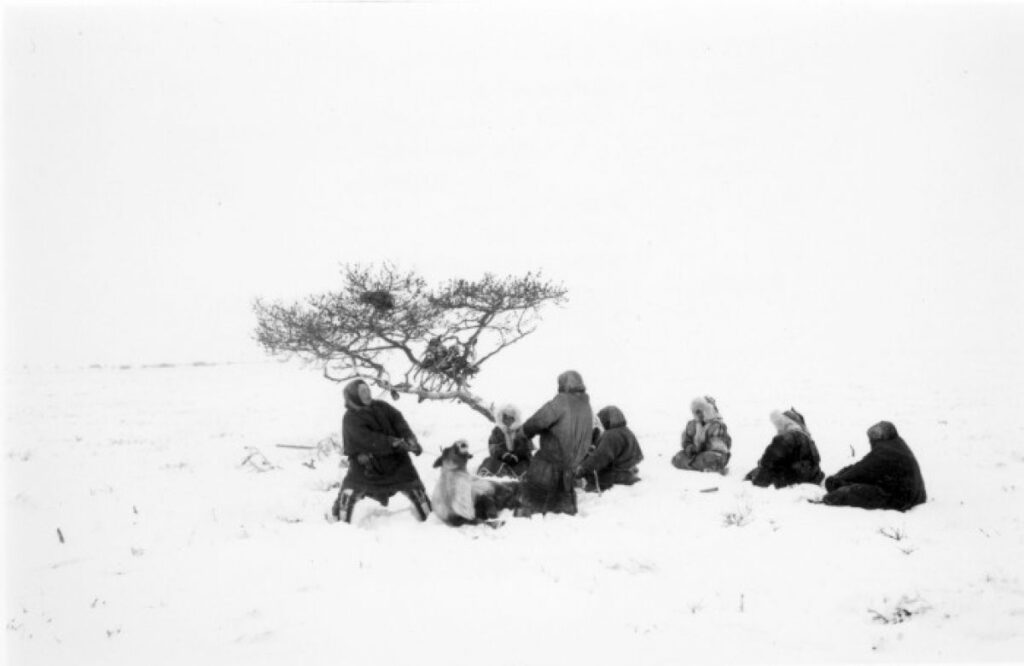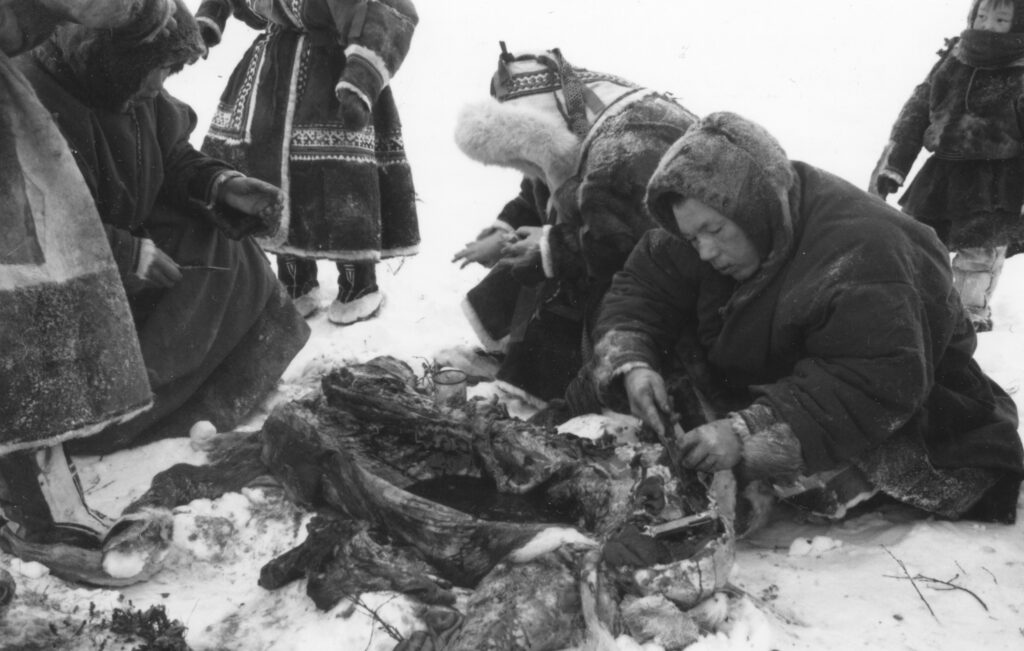


Seven Songs from the Tundra
An anthology of stories made collaboratively with the Nenets, an indigenous nomadic people of the Russian tundra under modern Communist rule. Beautifully composed from both archive material and cinematography, the film blends fiction and documentary to produce a vivid portrait of Nenets culture as told and performed by the people themselves. As the first feature film made in the Nenets language, Seven Songs makes an important contribution to contemporary indigenous cinema and a timely intervention into continuing calls for decolonization in Russia.
Programmer’s Note
When considering Seven Songs from the Tundra alongside other films directed by Anastasia Lapsui and Markku Lehmuskallio, one might be forgiven for thinking that they create such similar films one after another. They are stories of Indigenous people living in the Arctic Circle, often showing their lives in an unadorned, matter-of-fact way. However, upon deeper reflection, one can trace subtle differences that colour each film into its own hue, distinguishing these portrayals between documentary “fact” and narrative “fiction” – and all the shades in between. Indeed, Lapsui and Lehmuskallio’s project becomes more remarkable with each successive film and the accumulated investment we make as viewers, immersing ourselves in the worlds depicted. Seven Songs from the Tundra is a particularly rewarding experience, as its episodes distil fragmentary tales that are both specific in their context – the Nenets and the friction with which Soviet (Russian) monoculture inserted itself into their daily lives – yet also universal in the emotions and resistance to authority conveyed.
~ Herb Shellenberger
Director Biographies
Anastasia Lapsui (Nenets) is a filmmaker, screenwriter, and radio journalist born into a nomadic family in the Yamalo-Nenets Autonomous Okrug in 1944, northwest of Siberia. She has developed a highly original documentary and narrative filmmaking practice in collaboration with her partner, Markku Lehmuskallio. Together, they have produced elegant portraits of the Nenets, Sami, and other Indigenous peoples, incorporating traditional folktales and spiritual customs with meticulous depictions of their everyday lives. She studied at the Salekhard Pedagogical Institute (1963-1966) and Ural State University, becoming the first Indigenous radio journalist in Yamal. Her films have been widely exhibited at festivals and museums around the world, including the Berlinale, International Film Festival Rotterdam, Docpoint Helsinki, Toronto International Film Festival, Dok Leipzig, Midnight Sun Film Festival, and Karlovy Vary International Film Festival. She is the recipient of numerous awards including Finland’s top film prize, the Jussi Award, for Best Film (2000), Best Screenplay (2001) and Best Documentary Film (2003); Grand Prize from Festival International de Films de Femmes (2010); a Confédération Internationale des Cinémas d’Art et Essai Award from Berlinale Forum (2002); and the Finland Award (2009).
Markku Lehmuskallio is a film director and cinematographer born in 1938 in Rauma, Finland. His entry point into filmmaking began while working as a forester in Finland, where he created instructional films for farmers to teach them how to plant pine seedlings. This ecologically focused practice continued, and while filming in the Arctic regions of the former Soviet Union he met Anastasia Lapsui. They have since collaboratively produced numerous documentaries about the lives of Indigenous peoples in the Arctic Circle and around the world. Lehmuskallio’s films have been exhibited widely at venues around the world, including the Berlinale, International Film Festival Rotterdam, Docpoint Helsinki, Dok Leipzig, Midnight Sun Film Festival, Toronto International Film Festival, and Karlovy Vary International Film Festival, among many others. He is the recipient of numerous awards including Jussi Awards for Best Short Film (1973), Best Cinematography (1975), and Best Documentary Film (2003); an Honourable Mention from the Berlinale (1980); the Aho & Soldan Lifetime Achievement Award (2002); the Jury Prize Région de Nyon from Visions du Réel (2020); and the Finland Award (1998).
Director Filmographies
Anastasia Lapsui filmography (all co-directed with Markku Lehmuskallio): Pyhä (with Johannes Lehmuskallio, 2017), Tsamo (2015), Eleven Images of a Human (2012), Pudana – Last of the Line (2010), Earth Evocation (2009), Travelling (2007), The Sami (2006), Fata Morgana (2004), A Bride of the Seventh Heaven (2003), Mothers of Life (2002), Shepherd (2001), Seven Songs from the Tundra (2000), The Sacrifice – A Film about a Forest (1998), Anna (1997)
Markku Lehmuskallio filmography: Anerca, Breath of Life (with Johannes Lehmuskallio, 2020), Pyhä (with Johannes Lehmuskallio and Anastasia Lapsui, 2017), Tsamo (with Anastasia Lapsui, 2015), Eleven Images of a Human (with Anastasia Lapsui, 2012), Pudana – Last of the Line (with Anastasia Lapsui, 2010), Earth Evocation (with Anastasia Lapsui, 2009), Travelling (with Anastasia Lapsui, 2007), The Sami (with Anastasia Lapsui, 2006), Fata Morgana (with Anastasia Lapsui, 2004), A Bride of the Seventh Heaven (with Anastasia Lapsui, 2003), Mothers of Life (with Anastasia Lapsui, 2002), Shepherd (with Anastasia Lapsui, 2001), Seven Songs from the Tundra (with Anastasia Lapsui, 2000), The Sacrifice – A Film about a Forest (with Anastasia Lapsui, 1998), Anna (with Anastasia Lapsui, 1997), A Farewell Chronicle (1995), A Paradise Lost (1994), In the Shape of a Reindeer Across the Canopy of Heaven (1993), I Am (II) (1992), I Am (I) (1992), Inuksuk (1988), Finnish Mobile (1985), The Blue Mammy (1985), Skierri – Land of the Dwarf Birches (1982), The Raven’s Dance (1980), Mikä mies matsuri (1977), Elämän tanssi (1975), Tapiola (1974), The Swan (1974), Big Silence (1973), Muuttuva E-myymälä (1971), Ilta-Sanomat (1970)

